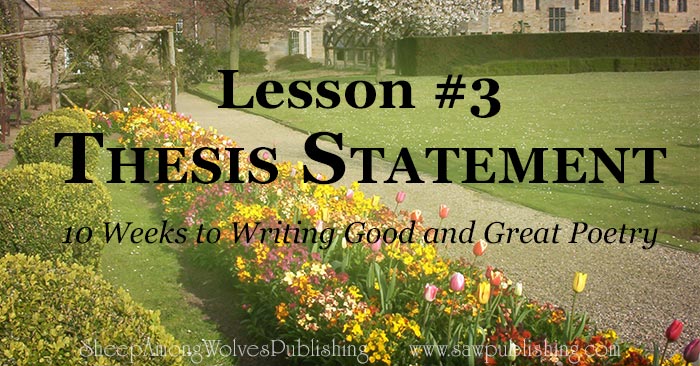Finding Your Thesis Statement
Sheep Among Wolves’ Good and Great Poetry Course was created to teach high school students how to write poems that are both good and great. This FREE 10-week course takes a look at some fundamental elements of poetical structure as well as the themes and subject-matter which really make up the soul of a poem. For a full explanation of the course, see our post entitled 10 Weeks to Writing Good and Great Poetry. To receive the course in 10 weekly email lessons, sign up here, or at the bottom of this post.

Just what is a thesis statement anyway? And what does it have to do with writing poetry? I wasn’t exactly fond of thesis statements when I first met with them in a high school literature course. It meant I had to come up with a main idea for my essay, and then logically defend it. I never enjoyed essays—which is a little bit ironic now—so the thesis statement was mostly a negative to me then. But honestly, thesis statements are not confined to essays and research papers. Anything that has a main point, has a thesis statement, and—regardless of my ninth grade opinions—knowing and recognizing your thesis statement can go a long way towards writing well.
Finding Your Thesis Statement
It’s so easy to write your entire poem as it comes into your head, and think of the point you want to make only when you come to the last two lines and want to wrap the poem up. But the best poems are based on complete thoughts with good conclusions, regardless of whether or not they have been clearly identified as thesis statements. Sometimes this point or conclusion will form itself in your mind as a line or two of poetry that have a certain ring to them, and usually appear towards the end of the poem. Sometimes, however, your thesis statement is only an abstract idea, and the work of writing the poem is what brings it down to poetry. Either way, it’s good to have a clear idea of what you want to say, before you write the poem. An easy way to find your thesis statement is to think of why you want to write the poem at all. That why is usually a good starting place for the conclusion you wish to draw.
Original Thoughts
Many people have written a poem about the flowers in springtime, the trees, the birds, or an autumn day. But why are some of these poems famous and some not? Why are some of them held up as poetic masterpieces, and others left to moulder in oblivion? Usually the poems that people remember and love, have an original thought as a basis. Usually, they express something which others didn’t see, or which ties in some other experience to make it original.
O, for that Flame of Living Fire
O for that flame of living fire,
Which shone so bright in saints of old!
Which bade their souls to Heav’n aspire,
Calm in distress, in danger bold.
Where is that Spirit, Lord, which dwelt
In Abra’m’s breast, and sealed him Thine?
Which made Paul’s heart with sorrow melt,
And glow with energy divine?
That Spirit which, from age to age,
Proclaimed Thy love, and taught Thy ways?
Brightened Isaiah’s vivid page,
And breathed into David’s hallowed lays?
Is not Thy grace as mighty now
As when Elijah felt its power;
When glory beamed from Moses’ brow,
Or Job endured the trying hour?
Remember, Lord, the ancient days;
Renew Thy work; thy grace restore;
And while our hearts to Thee we raise,
On us Thy Holy Spirit pour.
“O, for that Flame of Living Fire” is a hymn which illustrates this point. The poet asks where the Spirit of God is that worked so mightily in all the great men of Bible history, telling how their deeds were prompted by the Holy Ghost, and in conclusion requesting from God this power for ourselves. The idea of these Bible heroes and their actions is not a new one, and many hymns and poems have been written about the Holy Spirit, but in combining the two thoughts, the author finds a very original thought indeed, and expresses it in equally striking, powerful language. Going back to our definition of poetry in Lesson 1, this hymn really is a powerful thought expressed in equally powerful words.
New Slants on Old Thoughts
Another way of coming up with a good thesis statement is to find a new slant on an old thought, or a new way of using an old concept. We have all heard the story of Jacob—how he fled from his brother Esau, and laid himself down to sleep with his head resting on a stone, and there saw a vision of angels ascending and descending a ladder to heaven. But for most of us, this Bible story has a certain disconnect with our daily lives. It definitely did for me, until I read the hymn, “Nearer, My God, to Thee,” and the entire story took on a new meaning. By paralleling this account of Jacob’s life with the loneliness and darkness we sometimes experience in our own lives, the poet gives a new and refreshing slant on an old idea. She makes us think of ourselves as Jacob, and compels us to find in the midst of our darkness and grief the steps which lead to heaven.
Nearer, My God, to Thee
Nearer, my God, to Thee, nearer to Thee!
E’en though it be a cross that raiseth me,
Still all my song shall be, nearer, my God, to Thee.
Refrain:
Nearer, my God, to Thee, Nearer to Thee!
Though like the wanderer, the sun gone down,
Darkness be over me, my rest a stone.
Yet in my dreams I’d be nearer, my God to Thee.
Refrain
There let the way appear, steps unto Heav’n;
All that Thou sendest me, in mercy given;
Angels to beckon me nearer, my God, to Thee.
Refrain
Then, with my waking thoughts bright with Thy praise,
Out of my stony griefs Bethel I’ll raise;
So by my woes to be nearer, my God, to Thee.
Refrain
Or, if on joyful wing cleaving the sky,
Sun, moon, and stars forgot, upward I’ll fly,
Still all my song shall be, nearer, my God, to Thee.

Choosing Topics that are Great
The foundation of great poetry is a great idea. Your best ideas will probably form your best poems, as long as you are able to express them as they deserve. That is why forming a great idea is the best starting place for writing a great poem. Inspiration and thought go into choosing these topics, and the methods will vary from person to person, but be on the lookout for great ideas wherever you meet them, and you will find yourself with the beginnings of many great poems. How you develop them from there, depends on far more than I can discuss in this lesson, but the most important thing to do, is to collect those ideas, and write them down, or file them in some way so you don’t forget about the idea before you have time or inspiration to write the poem. Choose great ideas and it will be much easier to write great poems.
Choosing Topics that are Good
There are many great poems that none of us should read. Poems that are powerful, striking and impacting, but which have no place in Christian homes and hearts, because their content is not as good as it is great. My dear young poets, embarking on this wonderful adventure of writing poetry, be sure that your topics and expressions are always pure. We can do no worse than to lose goodness in greatness. No idea is truly great that is not truly good, and at the heart of every poem we write should be a sincere desire to write only that which will edify and uplift, and lead the soul of your readers closer to God and His will and ways. Writers of any kind hold a tremendous responsibility to influence their audience for good and not for evil, and it should be our pride and our privilege to use this responsibility wisely and truly, as good stewards of the gifts God has given us.
A Springboard to Success
Having a clear perception of your thesis statement narrows your focus and allows you to really express what it is which you have for your audience. It lets you know where you’re going, and when you’ve arrived. It allows you to find a powerful idea to use as the core of your message. It helps lay the foundation for a great poem. Knowing and understanding your thesis statement can dramatically advance you in your quest to write poems that are both good and great.
To receive a PDF of the assignment for this lesson sign up below.
How To Sign Up
All ten poetry lessons can be found by clicking on the Poet’s Corner tab in the menu. If you would like to receive the course assignments as well, you can sign up below to have the lessons and assignments delivered by email over a ten week period.
